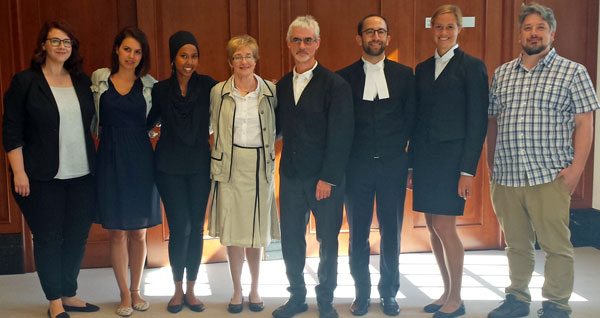Please support our coverage of democratic movements and become a supporter of rabble.ca.
Day 1, July 2, 2015
“This case is about the right to vote — the cornerstone of democracy.”
With these words, lawyer Steven Shrybman opened day one of hearings against the Harper Conservatives’ “Fair” Elections Act. The Council of Canadians, the Canadian Federation of Students and three individual electors are seeking an injunction to stop regressive new voter ID rules from coming into effect for October’s federal election.
Over eight hours in a Toronto courtroom, Shrybman presented powerful evidence that, if allowed to stand, the so-called Fair Elections Act would cause “irreparable harm” in the 2015 election and beyond.
Citing expert testimony, he argued that tens of thousands of eligible voters — mostly students, aboriginals, seniors and the homeless — would have their constitutional right to vote taken from them under the Conservatives’ new rules.
But the harm extends beyond even those individual voters. This is about the integrity of our democracy and the legitimacy of our government. “Public confidence in the outcome of the election may hang in the balance,” Shrybman argued.
Today’s primary focus was the Conservatives’ move to eliminate the voter information card as a valid form of identification.
In 2011, 400,000 people used voter information cards as official ID on Election Day — including 62 per cent of students who had the option.
Shrybman illustrated how there are very few forms of ID other than a driver’s licence that have your address on it. For example, a student living off campus whose name isn’t on the lease or a bill is unlikely to have ID with their address on it, making it very difficult to vote in October.
Elections Canada has 25 million voter information card templates ready to go for October, currently sitting in storage facilities around the country. And the Chief Electoral Officer confirmed that, if the injunction is granted, he will recognize them as valid ID at polling stations.
Restoring the voter information card as valid ID is not only doable, it’s what’s truly fair.
Tomorrow, government lawyers will tell the court how these restrictive new voter ID rules are necessary to stop rampant voter fraud — a manufactured crisis that was soundly debunked by expert testimony from former B.C. elections chief Harry Neufeld.
This is a good time to remember that before 2007 Canadian voters weren’t required to present any form of ID at polling stations.
This injunction boils down to two simple facts: Every citizen of Canada has the right to vote. And it’s our government’s responsibility to protect, not to interfere with, that right.
Bring on day two!
Please support our coverage of democratic movements and become a supporter of rabble.ca.



